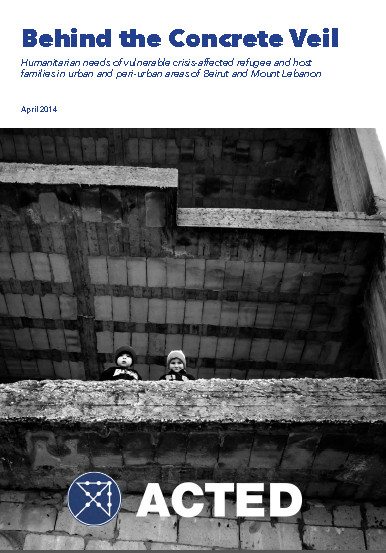Behind the Concrete Veil
 |
Ce qui se cache derrière le voile de béton
Humanitarian needs of vulnerable crisis-affected refugee and host families in urban and peri-urban areas of Beirut and Mount Lebanon
rapport Apr 2014 ; 32 pages
Ed. ACTED - Beirut
Téléchargeable sous format: PdF
Téléchargeable chez l'éditeur
Page de présentation d'un éditeur
Résumé:
Pour que le soutien humanitaire soit efficace, il faut tout d’abord définir précisément les besoins. Les équipes d’ACTED ont mené des évaluations dans leurs principales zones d’intervention, Beyrouth et le nord du Mont Liban, pour avoir un aperçu des besoins humanitaires des populations vulnérables, autant réfugiés syriens que familles libanaises.
Les évaluations révèlent que le manque de ressources financières combiné au coût des logements en augmentation permanente à Beyrouth et au nord du Mont Liban sont à l’origine de la plupart des problèmes auxquels font face les réfugiés, notamment les mauvaises conditions de vie en terme de protection, santé et hygiène.
Le rapport met également en lumière l’extrême vulnérabilité des populations locales, et combien il est important de travailler avec les autorités locales pour faire face à l’impact de l’augmentation de la population sur la disponibilité des services de base. Abstract:
The aim of this report is to provide an overview of the humanitarian needs faced by vulnerable populations in ACTED’s target areas of Beirut and northern Mount Lebanon (Baabda, Metn, Keserwane and Jbeil Districts). Assessed population groups include not only registered Syrian refugees, but also vulnerable Lebanese families, unregistered refugee households, and refugees registered in other regions but having moved to Mount Lebanon since, whose access to assistance is demonstrably affected by this displacement.
The assessment reveals that the lack of financial resources combined with the ever-increasing cost of living in Beirut and Mount Lebanon are the root causes of many challenges faced by refugees, especially bad living conditions (in terms of protection, health and hygiene).
The report also shows the high level of vulnerability of the local population, and how important it is to engage with local authorities to address the impact of the population increase on basic service provision.
Based on assessment findings, the following key priorities have been identified to effectively address humanitarian needs in Beirut and northern Mount Lebanon:
• Interventions aimed at improving access to financial resources and income-generating opportunities for vulnerable households, and targeting of shelter and WASH assistance based on economic vulnerability;
• Interventions aimed at improving access to adequate living conditions and WASH facilities for households living in sub-standard or over-crowded accommodation, with special on supporting households with adequate accommodation who are at risk of eviction;
• Needs-based assistance provision not only to registered refugees, but also to vulnerable Lebanese, and refugees that are either unregistered or registered in other areas, which can be achieved through tracking and referral mechanisms, notably in collaboration with local stakeholders;
• Strong and meaningful engagement with local authorities and community leaders to enable the identification and implementation of community-level interventions, addressing the impact of the population increase on basic service provision.
Mot clef: |
Pays concerné: |
Editeur/Diffuseur: |
|
ACTED - Beirut - Liban |
En cas de lien brisé, nous le mentionner à communication@pseau.org